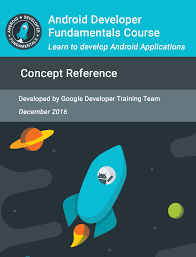android developer fundamentals course concepts
The Android Developer Fundamentals course is a comprehensive program designed to equip developers with the essential skills and knowledge needed to build robust Android applications. It covers a wide range of topics, from the basics of Android development to more advanced concepts. Here’s a brief introduction to some of the key concepts covered in the course:
- Introduction to Android Development: The course typically starts with an overview of the Android platform, its history, and the tools used for development such as Android Studio.
- Java/Kotlin Programming: Developers are introduced to either Java or Kotlin, the two primary programming languages used for Android development. They learn the syntax, data types, control flow, and other fundamental concepts necessary for Android app development.
- User Interface (UI) Design: Understanding how to create intuitive and visually appealing user interfaces is crucial. Concepts such as layouts, views, widgets, and resources are covered in this section.
- Activities and Fragments: Activities and fragments are fundamental building blocks of Android applications. Developers learn how to create, manage, and navigate between different screens using activities and fragments.
- Intents and Intent Filters: Intents are a fundamental concept in Android for communication between components. Developers learn how to use intents to start activities, services, or broadcast messages within and between applications.
- Data Storage: Android offers various options for storing data locally on the device, including SharedPreferences, SQLite databases, and file systems. Developers learn when and how to use each storage option effectively.
- Networking: Most Android apps require communication with remote servers to fetch or send data. Concepts such as HTTP networking, RESTful APIs, and asynchronous processing are covered to enable developers to integrate networking into their apps.
- Background Processing: Developers learn how to perform tasks in the background to ensure a smooth user experience. This includes working with background services, threads, and AsyncTask.
- Permissions: Understanding Android’s permission system is crucial for accessing sensitive device resources such as the camera, location, or contacts. Developers learn how to request permissions at runtime and handle permission requests gracefully.
- Material Design: Google’s Material Design guidelines are introduced to help developers design visually consistent and aesthetically pleasing apps that offer a great user experience across different Android devices.
- Testing and Debugging: Quality assurance is essential for any app. Developers learn how to write unit tests, instrumented tests, and use debugging tools to identify and fix issues in their code.
- Publishing Apps: The course typically covers the process of preparing an app for release, including creating a signed APK, optimizing app performance, and publishing the app on the Google Play Store.
These are just some of the core concepts covered in the Android Developer Fundamentals course. The course provides a solid foundation for developers looking to build Android applications and prepares them for more advanced topics in Android development.
